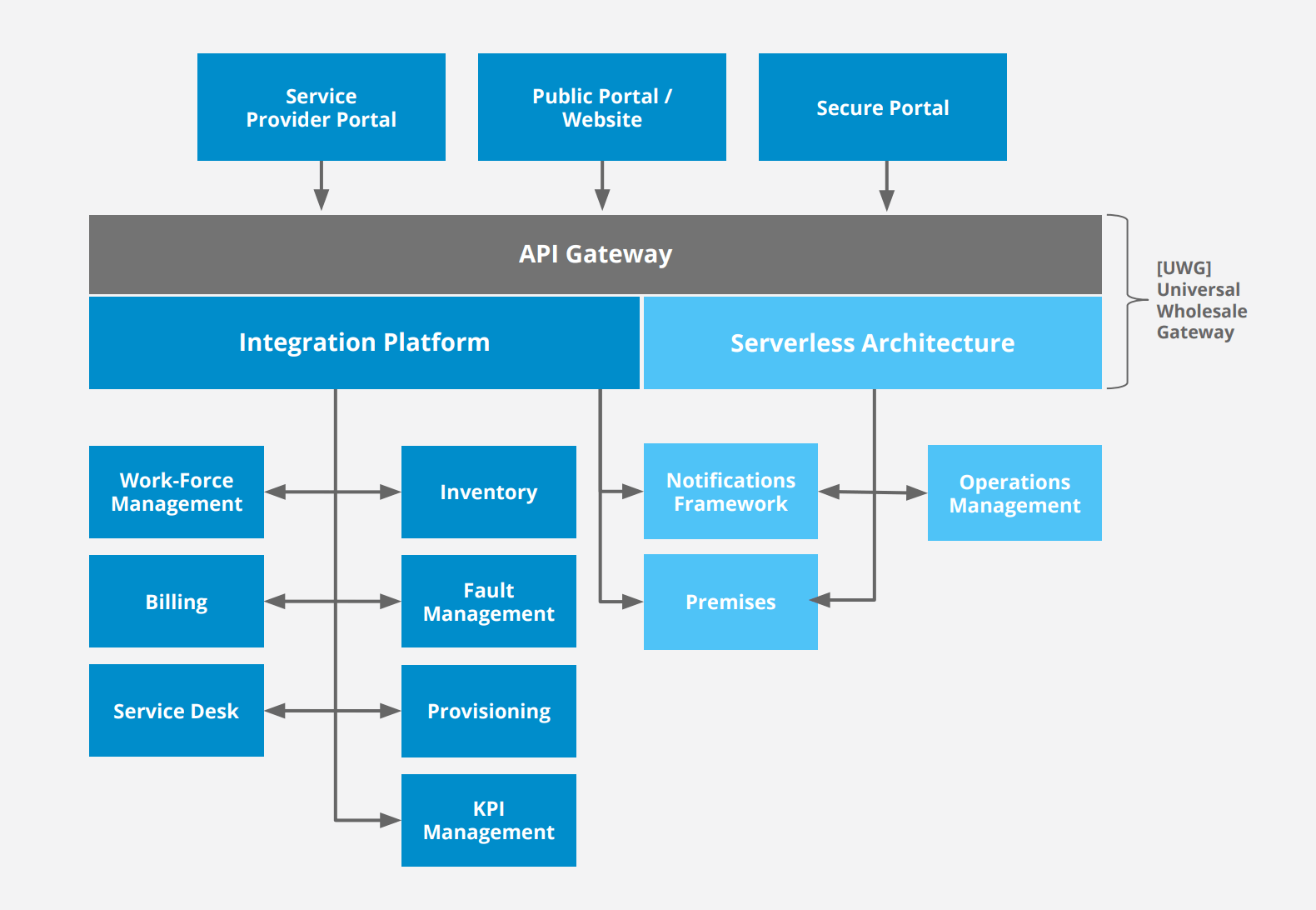
Case study: ‘Order to bill’ automation for major fibre rollout
National Broadband Ireland (NBI) secured the Irish Government contract to design, build and operate the new high-speed fibre broadband network for rural Ireland known as the National Broadband Plan.
The challenge
NBI needed to provide fast, reliable broadband to over 540,000 homes and businesses across Ireland in the largest infrastructure project since rural electrification. As a start-up organisation, it was challenged with building both the fibre network and supporting IT environment, while simultaneously growing its own business organisation and partnership ecosystem.
Within the IT domain, the biggest challenge was the Operating Environment (OE), designed to support NBI’s wholesale offer of broadband services to the public via Retail Service Providers. The OE enables product order, fulfilment, billing and assurance, and in a telecoms industry context it represents the Business & Operational Support Systems (BSS/OSS) for the fibre network. The OE works alongside other IT solution domains including Analytics, Enterprise Resource Planning (ERP) and Project Portfolio Management.
A unique aspect of NBI’s OE build-out was the strict KPI commitments within its public contract. It needed to achieve full business automation to the highest standards within aggressive delivery timelines. The only way to achieve such a high performance delivery was through a collaborative ecosystem of partners, working to an agile methodology.
The solution
Sonalake worked with NBI to analyse the business requirements, use cases and user journeys of the OE, and to design and build the OE architecture.
The OE, deployed on AWS, supports NBI’s B2B model to provide wholesale services to its Service Provider customers via a Unified Wholesale Gateway (UWG). The UWG acts as a clearly defined interface between the Service Providers and NBI. It includes a set of Web Portals and API’s to enable all interactions, supported by downstream systems for billing & invoicing, customer management, inventory, trouble ticketing, fault management, work-force management, order management, product catalogue and address management.
“Sonalake’s BSS solution is pivotal in enabling our customer journeys, from address search through to customer order management, billing and assurance. Their agile and collaborative approach as our software partner has been excellent” -John Power Director of IT, NBI
Sonalake was responsible for delivering the majority of the OE software components. These include the Service Provider and Public Portals, our CCB solution (product catalogue, customer and order management, billing and invoicing) and a series of microservices for premises/address management and notification services. Sonalake’s software works with a configurable third party integration framework (Snaplogic), the inventory, ticketing and workforce management products, and the downstream network component interfaces from Nokia to enable network provisioning.

In addition to these OE components, Sonalake delivered a Secure Portal for Government access to search and download KPI data and network infrastructure documents and maps. This fulfilled the strict governance, auditing and data providence requirements of this publicly funded project and it is supported by a major Data Analytics and Reporting Platform designed by NBI and collaboratively developed with Sonalake.
The project
The ‘greenfield’ project to design and develop the OE to the required performance specifications represented a unique challenge of speed and scale. As well as the OE technology platform itself, NBI faced the parallel design and build-out of its business processes and operations.
Rather than employ a major Systems Integrator, NBI assumed responsibility as the Prime Integrator in collaboration with a number of domain-specialist partners, including Sonalake as the primary telecom software provider. This early decision was taken to leverage the advantage of smaller company agility and was enabled by creating a collaborative ecosystem and open culture between the OE partners.
“Sonalake’s domain expertise and software delivery quality have been central to the success of NBI’s rapid build of our cloud-native Operating Environment, underlining our commitment to delivering high speed broadband services throughout the country” -Geoff Shakespeare COO, NBI
The project was planned according to a set number of major releases in accordance with the public contract, each representing an incremental scope of business automation. An agile software methodology was used by OE partners to achieve the tight timescales, with the first ‘go-live’ release delivered in early 2021 as originally contracted.
This enabled NBI’s B2B customers to start offering high-speed broadband in the geographic areas covered by the ongoing rollout of the fibre network. In parallel with the build and go-live release of the OE, a 24×7 IT support and service management operation was established within NBI. To support this, Sonalake designed and delivered an Observability Platform (based upon Grafana open source software) to provide live visibility of the OE production environment. Through high-level dashboards, NBI’s Service Desk Team and OE Partners can quickly determine the health status of the applications, systems and APIs that comprise the OE, enabling fault localisation and root cause analysis for any issues arising.
The result
The timely commercial launch of NBI’s Operating Environment (OE) represented a significant achievement in software and business systems project delivery at scale and at speed. This was acknowledged by NBI’s Service Provider customers as an important enabler to the rollout and adoption of the National Broadband Plan, emphasised by the COVID 19-induced dependency on high-speed connectivity and the opportunity for businesses and remote workers across rural Ireland.
Sonalake’s cloud-native solutions integrated into the API-centric, AWS-based OE microservices architecture to facilitate the prioritisation of the most urgent use cases and enable flexible evolution and scalability. The collaboration of the partner ecosystem enabled by NBI’s prime integrator approach, together with the adoption of appropriate agile methodologies and a shared open culture, enabled the successful achievement of this large scale project.